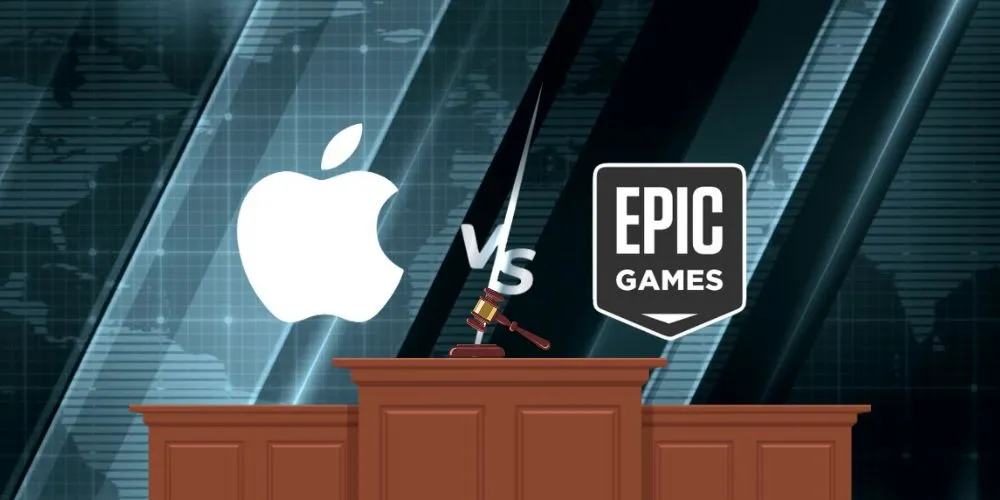The legal battle between Epic Games and Apple has become one of the most defining antitrust cases of the digital era. Initiated in 2020, this clash brought attention to the growing concerns over tech monopolies, market fairness, and digital ecosystem control. Epic Games, a prominent video game developer known for its hit game Fortnite, directly challenged Apple’s App Store policies, accusing the tech giant of monopolistic practices by enforcing restrictive payment systems and demanding a 30% commission on in-app purchases.
This case study delves into the background, legal arguments, and broader ramifications of this high-stakes legal battle. It also explores the challenges both companies face in shaping the future of app store governance, digital marketplaces, and the tech industry.
Background of Epic Games and Apple’s App Store
The dispute between Epic Games and Apple stems from the increasing dominance of app stores in the digital ecosystem. Apple’s App Store, launched in 2008, revolutionized software distribution and created concerns about control and competition.
The Rise of Epic Games
Epic Games was founded in 1991 by Tim Sweeney, initially as a small video game developer. Over time, it became a major player in the industry by developing Unreal Engine, a powerful game development platform used by numerous studios. However, Fortnite, a battle royale game released in 2017, catapulted Epic to new heights. With over 350 million registered users worldwide, Fortnite became a cultural phenomenon and generated billions in revenue, largely through in-app purchases.
Apple’s App Store and Its Market Power
Since its inception, Apple’s App Store has become a critical gatekeeper for mobile software distribution. As the only official app marketplace for iOS devices, Apple controls what apps can be distributed and how developers can monetize their apps. Apple’s 30% commission fee on in-app purchases and its rule that all transactions go through its payment system have long been a contention for developers. Despite this, Apple argues its policies are necessary to ensure security, user privacy, and a seamless user experience.
The Trigger: Epic’s Rebellion
In August 2020, Epic Games took a calculated risk by introducing an update to Fortnite that allowed players to make in-game purchases directly through Epic’s own payment system, bypassing Apple’s commission. This move blatantly violated Apple’s App Store rules, prompting Apple to remove Fortnite from its platform swiftly. Epic filed a lawsuit against Apple, accusing the company of anti-competitive behavior and monopolistic practices.
Epic Games’ Claims Against Apple
The lawsuit was framed as a fight for fair competition in the digital economy. At its core, Epic’s legal arguments centered around the notion that Apple was abusing its monopoly over the iOS ecosystem to stifle competition and exploit developers.
Allegations of Monopolistic Behavior
Epic Games argued that Apple’s control over the iOS platform amounted to a monopoly. Because Apple is the sole gatekeeper of app distribution on iOS devices, Epic claimed that developers had no choice but to comply with Apple’s restrictive terms, including its mandatory 30% commission on all transactions. According to Epic, it was a form of monopolistic control that limited competition and innovation.
The “Walled Garden” Argument
Epic Games also emphasized that Apple’s “walled garden” approach to app distribution and payment systems locked consumers and developers into a closed ecosystem. By preventing apps from offering alternative payment methods or directing users to external websites for transactions, Apple created a system where developers were forced to rely on Apple’s infrastructure, even if it was more costly.
Consumer Harm
One of Epic’s key arguments was that Apple’s policies ultimately harmed consumers by driving up prices. Epic argued that the 30% commission was passed on to consumers through higher digital goods and services prices. Furthermore, by stifling competition, Apple limited the availability of alternative payment systems that could offer lower transaction fees and better deals for consumers.
Apple’s Defense
In response to Epic’s claims, Apple presented a robust defense, maintaining that its App Store policies were fair and necessary for the proper functioning of its ecosystem.
Security and User Privacy
Apple’s primary defense was rooted in security. The company argued that controlling app distribution and payment systems could ensure that iOS remained a safe and secure platform for users. Apple pointed to its strict app review process and its prevention of third-party payment systems as measures that protected users from potential fraud, malware, and other security risks.
Developer Benefits
Apple also highlighted the benefits that developers receive from the App Store. By providing developers with a platform that reaches over a billion users worldwide, Apple argued that it offered unparalleled access to a global audience. Additionally, Apple pointed to its numerous developer tools, APIs, and support services, enabling developers to create and distribute high-quality apps.
Competitive Market
Apple refuted claims that it held a monopoly, noting that Fortnite and other Epic Games titles were available on various platforms, including Android, PlayStation, Xbox, and PC. Apple also argued that its App Store fees aligned with industry standards, comparing its 30% commission to the fees charged by other digital marketplaces, such as Google Play and Steam.
Legal Battle and Court Proceedings
The legal battle between Epic Games and Apple became a high-profile courtroom drama, drawing attention from regulators, tech companies, and consumers worldwide.
Key Legal Questions
At the heart of the case were several key legal questions:
- Does Apple’s control over the iOS ecosystem constitute a monopoly?
- Are Apple’s App Store policies anti-competitive?
- What constitutes consumer harm in the context of digital marketplaces?
Courtroom Testimonies
The trial featured testimony from major industry figures, including Tim Cook, CEO of Apple, and Tim Sweeney, CEO of Epic Games. Both executives made compelling arguments for their respective positions, with Sweeney emphasizing the need for open ecosystems and Cook defending Apple’s practices as necessary for user security and platform integrity.
Economic Experts Weigh In
Economic experts also played a critical role in the case, analyzing whether Apple’s 30% commission constituted an unfair tax on developers and consumers. While some experts sided with Epic’s argument that Apple’s control over iOS stifled competition, others defended Apple’s fee structure as standard within the industry.
Court Ruling and Aftermath
In September 2021, U.S. District Judge Yvonne Gonzalez Rogers delivered a mixed ruling that offered partial victories for both sides.
Apple’s Non-Monopolist Status
The court ruled that Apple was not a monopolist under federal antitrust law. Judge Gonzalez Rogers found that while Apple had significant control over the iOS ecosystem, it did not meet the legal definition of a monopoly. This was a critical victory for Apple, as a ruling in Epic Games’ favor could have opened the door to major regulatory changes.
Anti-Steering Practices
However, the court did rule that Apple’s anti-steering practices—prohibiting developers from directing users to external payment systems—violated California’s Unfair Competition Law. As a result, Apple was ordered to allow developers to provide links or buttons that would enable users to make payments outside of Apple’s system, bypassing the 30% commission.
Damages and Financial Penalties
While Apple avoided a ruling that would force it to alter its App Store business model fundamentally, it did face financial penalties. The court ordered Epic to pay Apple damages for breaching its contract by introducing its own payment system within Fortnite. Similarly, Epic’s claims for significant financial compensation were rejected, leaving the company with a partial victory but without the sweeping changes it had sought.
Broader Implications for the Tech Industry
The Epic Games vs. Apple case has far-reaching consequences for the tech industry, particularly concerning digital marketplaces and antitrust laws.
Impact on App Store Policies
Apple has already adjusted its App Store policies in response to the ruling. In addition to complying with the court’s order regarding anti-steering practices, Apple has introduced a program that lowers the commission for small developers from 30% to 15%, addressing concerns about the impact of its fees on smaller businesses.
Regulatory Scrutiny Intensifies
The case has also drawn the attention of regulators worldwide. In the European Union, Australia, and South Korea, lawmakers have launched investigations into Apple’s App Store practices, with some countries even introducing legislation to limit the power of App Store operators. In South Korea, for instance, new laws now require Apple and Google to allow alternative payment methods.
Precedent for Future Legal Challenges
Epic’s legal battle against Apple has set a precedent for other companies seeking to challenge the dominance of app store operators. The case has encouraged other developers, including Spotify and Tile, to raise similar concerns about Apple’s control over its platform, and it has added momentum to broader antitrust investigations into Big Tech.
Conclusion
The legal battle between Epic Games and Apple has sparked a global conversation about the power dynamics within digital ecosystems. While the court’s ruling provided a partial victory for both sides, the broader questions surrounding app store monopolies, developer rights, and consumer protection remain unresolved. As Epic Games appeals the ruling and regulatory scrutiny intensifies, the outcome of this legal conflict will likely shape the future of app store governance and digital marketplaces for years to come. This case underscores the growing importance of antitrust laws in the digital age and the need for regulatory frameworks that balance innovation, competition, and consumer rights.





